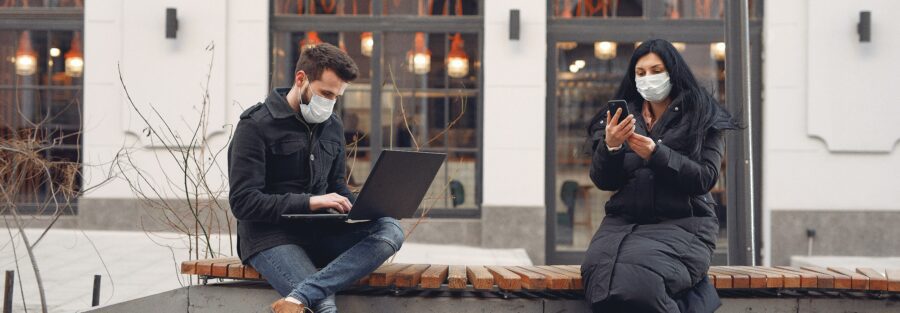Despite growing news consumption through social media, such a diversification is not without its pitfalls.
The wide availability of free information has created its own monster; a global fake news and misinformation culture.
The government of United Kingdom defines fake news as:
“The deliberate creation and sharing of false or manipulated information that is intended to deceive and mislead audiences, either to cause harm or for political, personal or financial gain.”
Misinformation and fake news have created a global epidemic of their own. With the spread of COVID crisis, related fake news took a toll on news consumers and their engagement with news on social media.
The users now ask: “Whom to trust?”
The 2021 Edelman Trust Barometer found the misinformation Infodemic to impact even the COVID recovery process-for example, people began mistrusting vaccines and many altogether avoided them believing in social media posts and resulting in countless untimely deaths.
“…Without a trusted leadership source to look to, people don’t know where or who to get reliable information. The global infodemic has driven trust in all news sources to record lows with social media (35 percent) and owned media (41 percent) the least trusted; traditional media (53 percent) saw the largest drop in trust at eight points globally..” -edelman.com
(The Edelman study found that Businesses, rather than governments or non-profit organisations, were the most trusted by most.)
The fake news impact during the Pandemic was highlighted in a study by PAHO/Pan American Journal of Health, titled “Infodemic: fake news and COVID-19 mortality trends in six Latin American countries”.
The study’s shocking conclusion?
“..It was observed that in countries with less use of social networks as the sole means for obtaining information and less trust in social network content, (COVID) mortality was also lower.”- www.paho.org
It should be stressed that fake news culture arrived way before the Pandemic.. The COVID crisis saw this fake news ‘culture’ advancing to a new level.
Sri Lanka too faced the onslaught of an Infodemic during its COVID crisis (circulation of fake news in Sri Lanka began even prior to the Pandemic. The Pandemic period made it ‘mainstream’). As a country-wide lockdown barring outdoor activities-that too, extending for weeks at a time- electrified people to be with their smartphones and no other social engagements, the next tidal wave of fake news was bursting at the social media seams.
“..Sri Lanka was able to slowdown the spread of the virus but like many other countries, it is also confronted with an ‘infodemic’ which is difficult to control. This has led to a battle on two fronts: medical and information. The infodemic is getting in the way of combating the virus outbreak…Misleading news does impact the proper identification and treatment of the patients.. two kinds of sources of disinformation in the Sri Lankan context: (i) mainstream media, which is willfully creating and spreading disinformation; and (ii) websites and social media users creating disinformation, which is widely shared by many users without any critical assessment.”- freiheit.org
With social media’s strong capabilities of targeting highly specific audiences, such an Infodemic culture has a devastating effect beyond its digital eco system -to even real world events.
As social media targets specific audiences, there are software that can create fake social media accounts by thousands and supply ‘news’ to the social ecosystem thus fabricating waves of previously non-existent incidents as actual ‘news’. “Pope Francis shocks world, endorses Donald Trump for president” has been the most well-known fake news wave in Facebook that impacted the outcome of one of the most decisive Presidential elections that the entire world was watching closely. In fact, the 2016 US Presidential election was the global event that brought the idea of ‘fake news’ to the world stage.
Where did the “Pope Francis” false news originate?
“WTOE 5 News”, a fantasy news web site, first ‘reported’ in 2016 saying Pope Francis had broken with tradition and unequivocally endorsed Donald Trump, for President of the United State.!!
The effects of Infodemics are damaging no less. They cost the society and news consumers. It is therefore important for us to know an estimate of the financial cost of fake news.
In December 2019, a study found that fake news is costing global economy US$ 78 Billion annually. The study by Israeli-based cybersecurity firm CHEQ and the University of Baltimore also found that exposure of brands (by advertising) next to fake news resulted in losses up to U$235 million annually for them. According to them there are other indirect costs from fake news such as loss of trust of institutions, and with the addition of such indirect costs the total loss to the global economy was estimated at US $100 Billion annually. Two years later today in 2022, this cost estimates ought to be revised further -upwards.
Apart from financial costs, the indirect, non-measurable societal damages from fake news are what perhaps harms us the most. A society deeply polarized by a political fake news campaign could leave untold levels of psychological damage and fractured social groups…effects that may not be reversible and likely last a lifetime.



